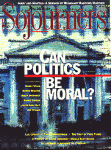The Republican Convention in Houston was dominated by the so-called Christian Right. "Right" in the political sense cannot be argued with. "Christian," however, can. If the mark of the Christian is loving kindness, another defining adjective is needed.
The Republican assembly was not a joyous gathering of like-minded people. It was more of a punitive expedition against people the Christian Right considers reprehensible, a fairly sizable number, which includes gays, reporters, the "gridlocked Democratic Congress," single mothers, women who have abortions, and above all, Hillary Clinton.
The wife of the Democratic candidate was, rhetorically at least, a severely battered woman. Rev. Pat Robertson, leader of the Christian Right, who among the many angry speakers may have been the angriest--Marilyn Quayle ran him a close second--regards Mrs. Clinton as a kind of unindicted co-conspirator in her husband's "radical plan" to "destroy the traditional family and transfer many of its functions to the federal government."
Robertson's statement, "Ladies and gentlemen, the carrier of this plague ["a belief in higher taxes, crushing regulation, and centralized government"] is the Democratic Party," gives the perfervid flavor of the occasion as well as anything.
The nominal keynoter of the affair was Sen. Phil Gramm of Texas, a former Democrat. He compared the Democratic ticket to a gussied-up used car. "A lemon," he called it. But the first speaker, Patrick Buchanan, who was folded into the program in the interests of unity, really set the tone. He laid about him with great vigor, reading a kind of dishonor roll of voters who could expect no home in any party in his charge.
He was followed to the podium by former President Ronald Reagan, who was in an exceptionally benign mode. He made an unexpected appeal for racial unity, something he never did while in office. To use one of the more overworked verbs in the Astrodome, the crowd "inhaled" his remarks. He was applauded deliriously.
Republicans are not much given to the light touch, wit was much wanting, but references to Bill Clinton's lame and belated marijuana confession--"And I never inhaled"--were good for a laugh-riot at any time. The other gag was the line immortalized by Lloyd Bentsen in the most enduring thrust of the 1988 campaign when he said to Dan Quayle: "You're no Jack Kennedy." Endless variations are possible, and the Republicans cheered every one.
The most coherent speech on the pervasive subject of "family values" was given by former Education Secretary William Bennett, who insisted that the Republicans were sincere, that they were not just pounding the Democrats, historically less pharisaical, into the ground. "When we talk about traditional family values we are not using code words. We are not seeking a political wedge issue, and we are not speaking to demean or to belittle others. Rather we're seeking to honor and affirm what is best in us....
"We will not be discouraged from discussing right and wrong without embarrassment. We will not be discouraged from defining religion as the anchor of morality, and we will never stop affirming that all real education is the architecture of the soul."
The theme of legions of sneering anti-family termites was sounded insistently by Dan Quayle as he made the rounds of delegates he hopes will support him for president in 1996. He told one state after another that he simply would not be called off the fight.
"Many people want me to back off," he said, in the face of little evidence. "Forget it," he said with great swagger. The insistence that they alone care for a stable family, with a momma and a poppa and even family prayers is one of their more grating messages.
What politician would be demented enough to say he thought the whole thing was a crock, that he's for divorce, adultery, and little girls having their ears pierced without parental permission? The late-night talk show hosts kid the life out of the self-righteous defenders of public virtue, but the majority of Americans certainly favor good home situations, at the very least because crime might be lessened as a result.
THE PILLARS of faith, hope, and charity came in for little attention. Faith seemed to be limited to a belief in one's moral superiority; hope that the Democrats would not win the election; and charity to the presidential fund-raisers that seemed to be held around the clock.
The Democrats' idea that money is important to the survival of families was dismissed as crass. It seemed from the polemics on the floor that freedom of choice about schools is far more important than the shoes needed to get to class. "Not by bread alone" is a sound maxim, but bread is also necessary, and it was way down on the Republicans' list.
Some Republicans philosophize that the party went so far right under Reagan that this year's Christian Right represents a small step in the same direction. But the Right-ers have developed a political salient that could increase their influence on the party. They affected the platform, especially on abortion, far more than their numbers warranted. Moderates told tales of takeovers at the precinct level; complicated, high-pressure tactics at district meetings; and a steady concentration on taking charge of the platform.
"Four more years," the faithful chanted at every pause in the rhetoric. That also means four more years for the Christian Right to tighten its grip on the party and purge those who adhere to the old rubric of live and let live.
Mary McGrory was a columnist for The Washington Post when this article appeared.

Got something to say about what you're reading? We value your feedback!
